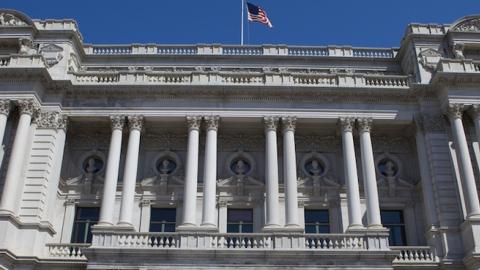Executive Summary
This white paper examines the history and constitutional status of the copyright functions of the federal government. It concludes that the U.S. Copyright Office will function better, be more respectful of our constitutional structure, and enhance the $1.1 trillion copyright sector if it is removed from the Library of Congress.
* Copyright functions were placed in the Library in 1870, as a result of lobbying by then-Librarian Ainsworth Spofford, who wanted to add the copies of books sent in for copyright registration to the collections of the Library.
* That structure remains in place; the head of the Copyright Office (the Register of Copyrights) must rely on the Librarian for HR, budget requests, IT, and even sign-off on regulatory matters.
* Rather than supporting and protecting the Copyright Office, the Library prioritizes other functions. As a result of its Cinderella status, the Copyright Offices’ services are badly outdated, some still paper-only.
* A bipartisan group of members of Congress and a broad array of stakeholders agree that the Copyright Office needs to modernize and should be removed from the Library.
* To comply with the Appointments Clause of the Constitution, the Register should be appointed by the President and confirmed by the Senate. Currently the Librarian selects the Register.
* The retirement of the current Librarian has led some frequent copyright critics to seek appointment of an activist Librarian to, for the first time in history, use that office to impose their perspectives on the Copyright Office. These comments illustrate an undisguised effort at institutional agency capture by a single interest group. It should be clear that a Copyright Office structured to be permanently answerable only to a particular perspective is bad government.
* The Copyright Office can and should continue to provide its expert, nonpartisan advice to Congress, balancing the interests of all copyright stakeholders as it has always done.
* The Copyright Office is perhaps the best investment in government with a more than $70,000 to $1 return on taxpayer funds. Private partnerships can keep modernization costs low. Fees can be raised to offset expenses. And the benefits to reducing regulatory compliance costs and lowering information costs will provide a return through increased economic activity.
* An array of conservative, pro-small government organizations recognize this value proposition. Americans for Tax Reform sees the potential that “A modern Copyright Office will reduce friction in the over $1.1 trillion marketplace for copyrighted works, incentivize creativity, innovation investment and jobs….” The American Conservative Union and Citizens Against Government Waste also support a “twenty-first century Copyright Office.”
* The question is not whether the Copyright Office should modernize – it must. It is whether to do so through the filter of the Library of Congress and its other priorities, or in a way that allows the creation systems designed for the needs of the Copyright Office? The answer is clear – the Copyright Office should have the authority to modernize for the needs of its customers.


















